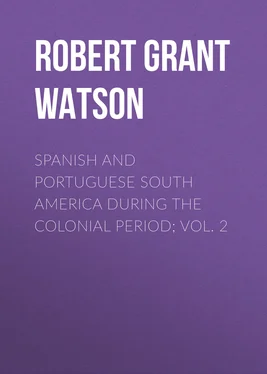Robert Grant Watson - Spanish and Portuguese South America during the Colonial Period; Vol. 2
Здесь есть возможность читать онлайн «Robert Grant Watson - Spanish and Portuguese South America during the Colonial Period; Vol. 2» — ознакомительный отрывок электронной книги совершенно бесплатно, а после прочтения отрывка купить полную версию. В некоторых случаях можно слушать аудио, скачать через торрент в формате fb2 и присутствует краткое содержание. Жанр: foreign_prose, История, foreign_edu, foreign_antique, на английском языке. Описание произведения, (предисловие) а так же отзывы посетителей доступны на портале библиотеки ЛибКат.
- Название:Spanish and Portuguese South America during the Colonial Period; Vol. 2
- Автор:
- Жанр:
- Год:неизвестен
- ISBN:нет данных
- Рейтинг книги:3 / 5. Голосов: 1
-
Избранное:Добавить в избранное
- Отзывы:
-
Ваша оценка:
- 60
- 1
- 2
- 3
- 4
- 5
Spanish and Portuguese South America during the Colonial Period; Vol. 2: краткое содержание, описание и аннотация
Предлагаем к чтению аннотацию, описание, краткое содержание или предисловие (зависит от того, что написал сам автор книги «Spanish and Portuguese South America during the Colonial Period; Vol. 2»). Если вы не нашли необходимую информацию о книге — напишите в комментариях, мы постараемся отыскать её.
Spanish and Portuguese South America during the Colonial Period; Vol. 2 — читать онлайн ознакомительный отрывок
Ниже представлен текст книги, разбитый по страницам. Система сохранения места последней прочитанной страницы, позволяет с удобством читать онлайн бесплатно книгу «Spanish and Portuguese South America during the Colonial Period; Vol. 2», без необходимости каждый раз заново искать на чём Вы остановились. Поставьте закладку, и сможете в любой момент перейти на страницу, на которой закончили чтение.
Интервал:
Закладка:
The Dutch statesmen, although they were slow at arriving at conclusions, could not but perceive that the Portuguese diplomatist had been merely seeking to gain time. They therefore called upon him to give a categorical statement of the intentions of his government with reference to Brazil . He replied in a note, in which he asserted that he had instructions to treat with them respecting the affairs of Pernambuco ; and he requested that a conference might take place in time to save them the expense of fitting out an unnecessary armament. The Dutch Government, perceiving that he was only renewing his former practices, declined his proposal; whereupon De Sousa, being hard pressed, offered to communicate the instructions on which he was to act. This was a bold step; for it required the exercise of some creative genius on his part. He had, however, with him some blank despatches from his Government already signed, and one of these he filled up so as to suit the moment. The result was that the Dutch, being deceived, suspended their naval preparations.
The ambassador, however, although he had tricked the States, was perfectly open in his communications with his own Government; and he suggested to his sovereign to order his own disgrace or punishment should it be necessary to disavow the act which, according to his knowledge of the existing circumstances, he had judged best for the public interests. His action was secretly approved; but the Portuguese Government had sufficient decency to refrain from any open commendation of the ambassador’s conduct, nor did they confer upon him any reward. The King now assured the States that the insurgents in Pernambuco disregarded his authority, and that, therefore, they were justified in making war upon them. The Dutch naval preparations were therefore resumed; but they had been delayed for several months. It was November 1645 before the fleet was ready to sail; the frost delayed it at Flushing three months longer, and six months were consumed upon the voyage. Had the insurgents possessed the means of pressing the siege of Recife with vigour, the convoy would have arrived to find that place in the possession of the Portuguese.
As it was, the arrival of the fleet had the effect of prolonging this lingering war for years still to come. With the fleet arrived five new members of the Council, with six thousand troops, besides seamen and volunteers, all under the command of the experienced Schoppe. The first attempt of the new general was to regain possession of Olinda ; but in this he was defeated. As, however, he had now a superior force in the field, the insurgents thought it advisable to evacuate Paraïba , and accordingly sent orders to Camaram to withdraw from that captaincy.
The Dutch leader next made a descent upon the northern captaincies, in which he made preparations for the future supplies of provisions for Recife . He sent also a considerable force to the river San Francisco for the purpose of cutting off the source from which the Portuguese were nourished; but in this latter attempt he was not so successful, and lost a hundred and fifty men. He next secretly fitted out a naval expedition with which he set sail to surprise Bahia . Landing upon the island of Itaparica , he established himself upon a commanding position, which he fortified. The Governor-General, being taken completely unawares, thought only of protecting the city; and meanwhile the invaders devastated the Reconcave unopposed. On this the Governor-General determined to attack the Dutch position—an unsuccessful enterprise—in which six hundred men were sacrificed. After this, Schoppe, who had only meant to effect a diversion in favour of Recife , returned to that place.
The Portuguese were now, in turn, considerably straitened for supplies; and Vidal had to proceed on foraging expeditions to Paraïba and to the Potengi . The insurgent leaders, however, were buoyed up by the hope which they entertained of assistance from Portugal. So strongly indeed did they entertain this hope that they concerted measures for the co-operation with them of the fleet which was to arrive; and a battery which was now erected caused much trouble to Recife . As it commanded the harbour as well as the streets, the Dutch were compelled to remove their vessels. In one of the sallies made by the Portuguese, the palace built by Count Nassau was sacked.
1647.
The convenient pretence that Portugal and the States were still at peace was abandoned, in so far as South America was concerned, after the attack by the Dutch on Bahia . The order of the Jesuits in Rio de Janeiro contributed to the insurgent cause a ship-load of supplies. A new Governor-General now arrived at Bahia in the person of the Count of Villa Pouca, who brought out with him reinforcements in twelve ships, three of which were unsuccessful in a conflict with the Dutch. The arrival of this fleet without any considerable succours for Pernambuco was a sore trial to the patriots of that province. The fleet brought them, however, a new commander, Francisco Barreto, with the rank of Campmaster-General. He had with him an escort of three hundred men, together with arms and ammunition. The Dutch, having information of his sailing, intercepted his ships off Paraïba , and Barreto was carried prisoner into Recife . After nine months’ captivity he effected his escape and joined the insurgents.
It certainly seemed a measure little calculated for insuring success to supersede at this juncture two such capable and efficient commanders as Fernandes and Vidal, who had hitherto headed the insurrection with such vigour, and who were so thoroughly acquainted with the country in which they had to operate. Such, however, was their thorough loyalty, and such the good sense of Barreto in conforming to their advice, that no ill effects resulted from this change in the command. In the course of the insurrection, Vidal and Vernandes had overrun one hundred and eighty leagues of country, from Ceará to the San Francisco ; they had captured eighty pieces of cannon; and they now delivered up to the new commander two months’ provisions for the army, twenty-four contos 2 2 = £240,000.
in specie, and the value of eighteen thousand cruzados . 3 3 = £4500.
1648.
Soon after this event a fresh fleet arrived from Holland, bringing out six thousand men, which placed the Dutch at an unmistakable advantage in the field, compelling the Portuguese to contract the limits of their operations. The insurgent leaders, with this view, called in their troops from various out-stations, and evacuated Olinda , confining themselves between Serinhaem and Moribeca . All of the inhabitants of the Varzea , capable of bearing arms, were ordered to repair to the camp. Upon a muster being taken, the entire insurgent force was found to number only three thousand two hundred men. Its quality, however, made up for its deficiency in quantity.
In describing the details of this long and tedious colonial war, one is glad to arrive at a point which, though it did not mark its conclusion, was nevertheless decisive as to its result. Such a point is the first battle of Guararapes . The Dutch commander had determined to take possession of the small town of Moribeca , from which place he could co-operate with the fleet destined for Nazareth . With this view he attacked the estancia of Barreta , making prisoner of Soares, the officer in command. A range of hills, called the Guararapes , rises between three or four leagues south of Recife , its skirts extending to within three miles of the sea, the intervening space being swampy. Where the range most nearly approaches the ocean there is only a narrow slip of land between the hills and the swamp—the entrance to the pass being between a lake and a thicket. Of this pass the Portuguese took possession, being protected by the wood from the view of an approaching enemy.
Читать дальшеИнтервал:
Закладка:
Похожие книги на «Spanish and Portuguese South America during the Colonial Period; Vol. 2»
Представляем Вашему вниманию похожие книги на «Spanish and Portuguese South America during the Colonial Period; Vol. 2» списком для выбора. Мы отобрали схожую по названию и смыслу литературу в надежде предоставить читателям больше вариантов отыскать новые, интересные, ещё непрочитанные произведения.
Обсуждение, отзывы о книге «Spanish and Portuguese South America during the Colonial Period; Vol. 2» и просто собственные мнения читателей. Оставьте ваши комментарии, напишите, что Вы думаете о произведении, его смысле или главных героях. Укажите что конкретно понравилось, а что нет, и почему Вы так считаете.












